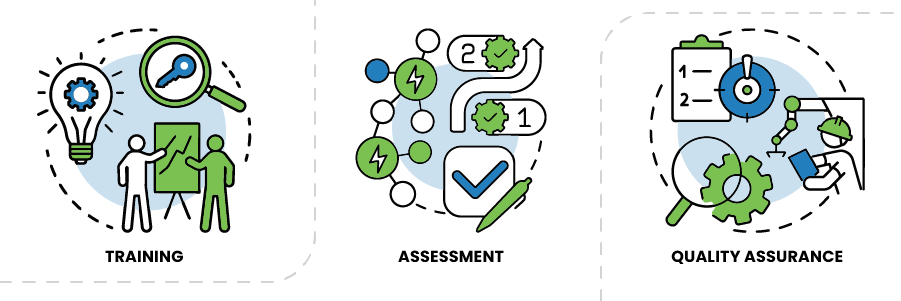We have heard in assessment and training, the term “TAQA” is frequently mentioned, causing confusion about its meaning and relevance. Contrary to common belief, TAQA is not a standalone course but rather an acronym representing a comprehensive suite of qualifications encompassing Training, Assessment, and Quality Assurance. This blog will examine the various qualifications under TAQA, providing insights into the differences and career possibilities each one presents.

TAQA Acronym Breakdown:
TAQA stands for Training, Assessment, and Quality Assurance. Each letter corresponds to a specific set of qualifications that cater to different aspects of assessment and training.
T - Training Qualifications:
The “T” in TAQA stands for Training, and this segment involves the Education and Training qualifications. These qualifications are designed for individuals aspiring to teach or train adults in specific industries. Notable qualifications include:
- Level 3 Award in Education and Training (AET): Formerly known as PTLLS, this qualification serves as an entry point for those aiming to teach in further education settings.
- Level 4 Certificate in Education and Training (CET): This qualification requires candidates to be in a teaching role and involves real-life teaching observations.
- Level 5 Diploma in Education and Training (DET): The most advanced qualification, DET provides a broad range of skills and qualifies individuals for the Qualified Teacher Learning and Skills (QTLS) status.
A - Assessment Qualifications:
Assessment, the second component of TAQA, focuses on various Assessor qualifications. Each qualification serves a specific purpose, depending on the combination of three key units:
Unit 1: Understanding the Principles and Practices of Assessment
Unit 2: Assess Occupational Competence in the Work Environment
Unit 3: Assess Vocational Skills, Knowledge, and Understanding
Noteworthy Assessor qualifications include:
- UPPA (Level 3 Award in Understanding the Principles and Practices of Assessment): Formerly known as PTLLS, this qualification serves as an entry point for those aiming to teach in further education settings.
- AVRA (Level 3 Award in Assessing Vocationally Related Achievement): Qualifies individuals to assess in a classroom, workshop, or virtual learning settings.
- ACWE (Level 3 Award in Assessing Competence in the Work Environment): Enables individuals to assess in a workplace setting.
- CAVA (Level 3 Certificate in Assessing Vocational Achievement): The most sought-after qualification, combining all three units, allowing individuals to assess in both learning and workplace environments.
QA - Quality Assurance Qualifications:
Under the Quality Assurance segment of TAQA, Internal Quality Assurance (IQA) qualifications come into play. These qualifications, rated at Level 4, represent a higher level of learning than Assessor courses. Key IQA qualifications include:
-
Level 4 Award in Understanding the Internal Quality Assurance of Assessment Processes and Practice
(Unit 1 only): A theory-only course suitable for professional development. -
Level 4 Award in The Internal Quality Assurance of Assessment Processes and Practice
(Units 1 and 2): Qualifies individuals to become Internal Quality Assurers (IQAs). -
Level 4 Certificate in Leading the Internal Quality Assurance of Assessment Processes and Practice
(Units 1, 2, and 3): This comprehensive qualification not only certifies individuals as IQAs but also empowers them to manage internal quality procedures, staff, and coordinate with External Quality Assurers (EQAs).
The Significance of TAQA Qualifications:
TAQA qualifications play a pivotal role in career advancement within the assessment and training sector. Whether an individual is already involved in teaching or aspiring to enter the field, adding Assessor and IQA courses to their skill set can enhance their CV and broaden opportunities within the educational and assessment landscape.

Assignments and Assessment Types:
For TAQA qualifications, assignments vary, including essay-style assessments for theoretical units and work documents serving as evidence for practical units. Assignments encompass initial assessment paperwork, assessment plans, various assessment methods, evidence and records, feedback, self-evaluation, and more.
TAQA is not a singular course but a comprehensive suite of qualifications encompassing Training, Assessment, and Quality Assurance. Understanding the various components and their applications in education and training is crucial for individuals seeking career advancement and recognition in the field.




